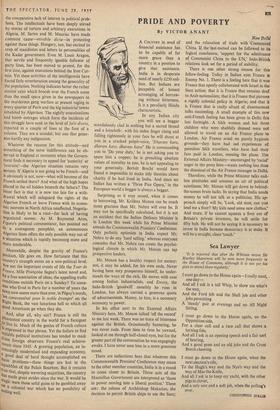PRIDE AND POVERTY
fly VICTOR ANANT
A COUNTRY in need of financial assistance has to be capable of far more grace than a country in a position to give that assistance. India is in desperate need of nearly £250 mil- lion. But Indians are incapable of honest scrounging, of borrow- ing without bitterness. It is a peculiarly Hindu characteristic.
In any Indian city you will see a beggar scandalously clad in nothing but a sacred thread and a loincloth : with his index finger rising and falling righteously in your face he will shout at you in a cracked pulpit-voice, `Dharant karo, dharam karo, dharam karo!' He is commanding you to 'Do your duty,' he is not asking you to spare him a copper; he is preaching absolute values of morality to you, he is not appealing to your generosity. Bertolt Brecht would have found it impossible to make tidy theories about charity if he had lived in India. And since no Indian has written a 'Three Pice Opera,' in the European world a beggar is always a beggar.
Surprising as it may sound, when it comes to borrowing, Mr. Krishna Menon can be much more gracious than Mr. Nehru will ever be. It may not be specifically calculated, but it is not an accident that the Indian Defence Minister is in London this week while his Prime Minister attends the Commonwealth Premiers' Conference. Only pathetic optimists in India expect Mr. Nehru to do any 'hard selling,' whereas everyone concedes that Mr. Nehru can create the psycho- logical climate in which Mr. Menon can tap prospective lenders.
Mr. Menon has a healthy respect for money; not, it may be added, for his own ends. Never having been very prosperous himself, he under- 'stands the ways of the rich. He moves with ease among Indian industrialists, and Envoy, the Indo-British 'goodwill' monthly he runs in London, has always carried a generous quota of advertisements. Money, to him, is a necessary accessory to power.
In his office next to the External Affairs Ministry here, Mr. Menon talked 'off the record' to me last week. There was no trace of bitterness against the British. Occasionally bantering, he was never rude. From time to time he yawned, looked at me through half-closed eyes, but for the greater part of the conversation he was engagingly awake. I have never seen him in a more generous mood.
There are indications here that whatever this Commonwealth Premiers' Conference may mean to the other member countries, India is in a mood to come closer to Britain. Three acts of the Macmillan Government are interpreted as 'those in power moving into a liberal position.' These are: the release of Archbishop Makarios; the decision to permit British ships to use the Suez; New Delhi, and the relaxation of trade with Communis( China. If the last-named can be followed to its logical conclusion, 'support for the admittance of Communist China to the UN,' Indo-British relations look set for a period of stability. There is one other strong reason for this fellow-feeling. Today in Indian eyes France is Enemy No. 1. There is a feeling here that it was France that openly collaborated with Israel in the Suez action; that it is France that remains deaf to Arab nationalism; that it is France that pursues a rigidly colonial policy in Algeria; and that it is France that is really afraid of disarmament talks succeeding. A small example of this new anti-French feeling has been given in Delhi this last fortnight. A Sikh woman and her three children who were shabbily dressed were not allowed to travel on an Air France plane to London. Air France acted on purely hygienic grounds—they have had sad experiences of penniless Sikh travellers, who have had their fare paid in London, messing the plane. The External Affairs Ministry—encouraged by 'racial' anger in the press here—wants nothing less than the dismissal of the Air France manager in Delhi. Therefore, while the Prime Minister talks end- less platitudes and assumes an air of political saintliness, Mr. Menon will get down to behind- the-scenes brass tacks. In saying that India needs money he will not talk as a politician. His ap- proach simply will be, 'Look, old man, can you lend me a fiver? My kids need some new clothes.' And more, if he cannot squeeze a fiver out of Britain's private investors, he will settle for fifty bob. He will not be saying it is necessary to invest in India because democracy is at stake. It will be a straight, clean 'touch.'


































 Previous page
Previous page